
Image: Shutterstock
One of the most effective ways for young children to gain knowledge and develop crucial abilities is through play. So, if you’re in search of some fun and educational activities to do at home, word games for kids are the perfect option to keep your little one engaged. This game also makes learning at home enjoyable and lays the foundation for successful school learning. Moreover, word games assist your kid improve their vocabulary, spelling, grammar, writing, reading, verbal, and communication skills. Parents can study alongside their kids as children like having their parents participate in their learning. In this post, we present you with a list of fantastic word games that kids and adults may enjoy together. Read on.
Benefits Of Word Games
If you are wondering why word games for children are beneficial, here are some reasons:
- Develops vocabulary
- Improves fluency in the language
- Hones comprehension and reasoning skills
- Develops a love of words and reading
- Sparks their imagination and memory
- Improves their problem-solving skills
- Encourages creativity
- Serves as a great pastime for the family
- Stimulates the brain
- Improves concentration
There are many word games for kids that help them learn new words. These games are entertaining and educational, making them enjoyable for everyone involved.
We have listed the 20 best word games for kids. These games will ensure you and your children have a great time learning new words.
1. Hangman

Image: Shutterstock
Hangman is a fun paper and pencil guessing word game for kids that can be played between two players. More players can participate and take turns as well. It is a simple game where a stickman is hanged if a player fails to get the word right.
Age group: 6 to 10 years
No of players: 2
How to play:
- Take a sheet of paper and a pen and draw gallows.
- The first player thinks of a word and draws dashes above the gallows equal to the number of letters in the word.
- The other player starts guessing the letters one by one.
- If the letter the player says is in the word, the first player writes it in the corresponding spaces on the dashes.
- If the letter is not in the word, the first player draws one part of the stickman, starting from the head and followed by the body, hands, and legs.
- If the stickman gets completed before the second player guesses the word, that player loses.
- Switch sides and start again.
- Proper nouns or slang words are not allowed.
2. Name the animal
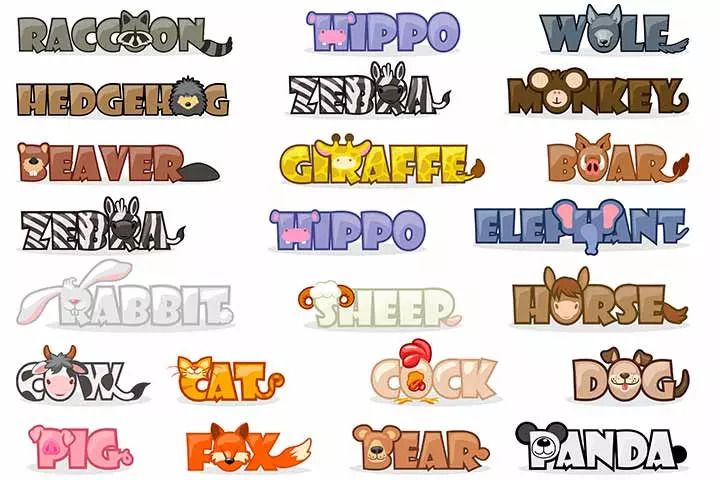
Image: Shutterstock
Name the animal is a multiplayer kids word game that can help teach your children animal names and improve their reasoning skills. This game also offers your child the opportunity to exercise their lateral thinking skills.
Age group: 4 to 7 years
No of players: 2 or more
How to play:
- You can be the host of the game.
- Make a list of common animals and a list of words that rhyme with these animal names.
- Call out each player and present them a rhyming word, and let them guess the animal name. You can say things like, “I rhyme with fog. I am a …..”
- The player who gets the maximum words correct is the winner.
- You can also teach them animal sounds by substituting animal names with their sounds.
3. I spy

Image: Shutterstock
I spy is one of the easiest games of the lot. All you need is your imagination and some eager players.
Age group: 4 to 6 years
No of players: 2 or more
How to play:
- Locate an object, and tell your child its first letter saying, “I Spy an object starting with the letter ….”
- Your child looks around and recognizes each object corresponding to that letter.
- Stop when they get it right and continue the game with the next player.
- You can also mention the color or shape of the object and let your child guess it correctly.
4. Make a word
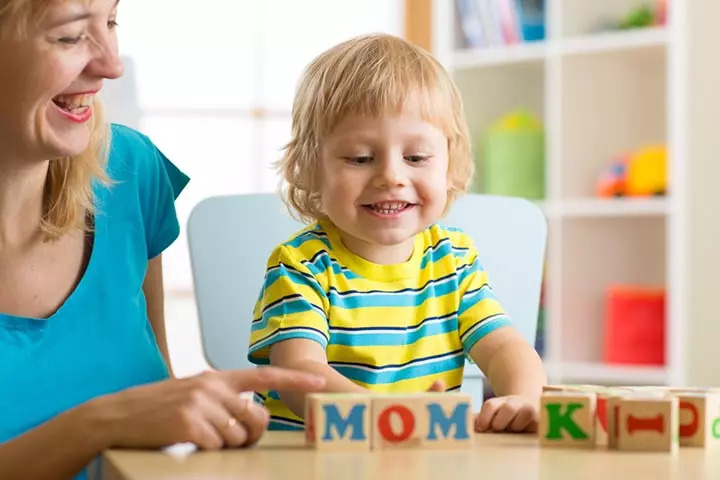
Image: Shutterstock
If your child is starting to learn new words, this word game for kids is useful. You can also play this game with older kids to make them learn difficult words and improve their memory. This game lays a solid foundation for playing advanced spelling games, such as Scrabble.
Age group: 4 to 12 years
No of players: 2 or more
How to play:
- You can play this game with younger children if you have magnetic letters, plastic letters, letter mats, or letter blocks.
- Give them a set of letters and ask them to make two- or three-letter words with them.
- For older children, you can play the game mentally or write a set of letters on a piece of paper and ask them to make as many words as they can from them.
- You can even play a timed version of the game with older children as they enjoy a good challenge.
5. Rhyming words
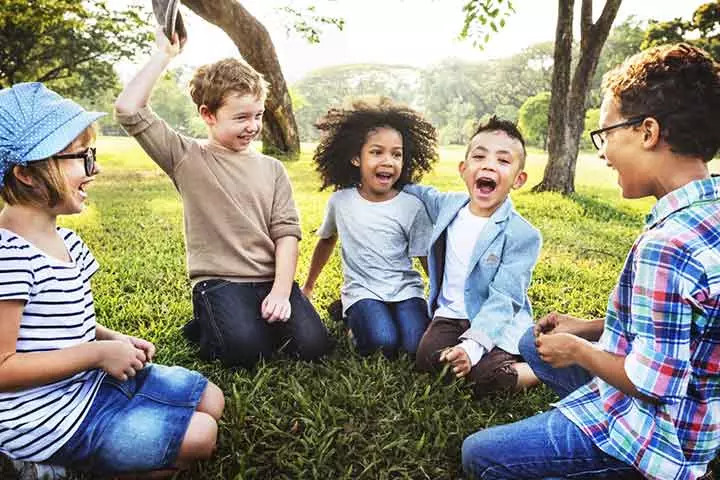
Image: Shutterstock
Rhyming Words game is a variation of Name the Animal. This word game for kids encourages your child to learn new words and helps hone their reasoning skills.
Age group: For ages 3 to 6 years
No of players: 2 or more
How to play:
- Name any animal.
- Ask your children to say the words that rhyme with the name of the animal, in turns.
- For example, when you say the word “dog,”your children should come up with words such as fog, hog, and log.
- Continue with a player until they run out of words and repeat the game with the next player.
6. Name, place, animal, thing
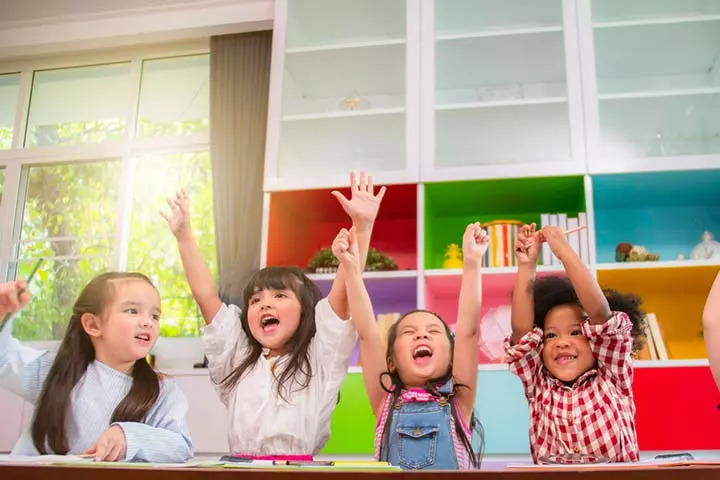
Image: IStock
You might remember playing this game as a child yourself. This game helps in expanding your child’s knowledge and memory.
Age group: 5 years and above
No of players: 2 or more
How to play:
- Give each player a sheet of paper and a pencil.
- Say a letter of the alphabet and start a timer.
- Each player must write the words of a name, place, animal, or a thing starting with that letter. For example, if the letter is A, a player may write, “Alex, Australia, Ape, Apple,” under each of these categories, respectively.
- You can assign different letters to different players or the same letter to each one.
- You can include other categories as per your convenience.
7. Hink pink
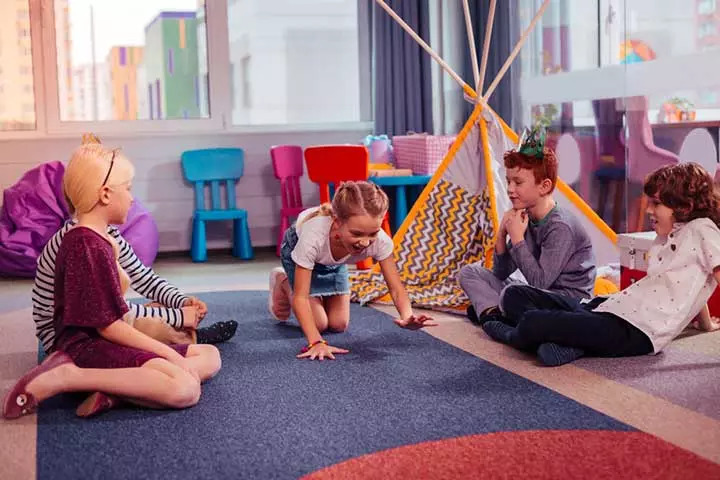
Image: Shutterstock
Children love this game. This word game for kids is designed to maximize fun while learning new words and their meanings. The game can help improve your child’s ability to solve crossword puzzles and cryptic crosswords.
Age group: 4 to 12 years
No of players: 2 or more
How to play:
- Ask each player to come up with a set of rhyming monosyllabic words, e.g., fat rat.
- Help them make a clue about their words. In this case, the clue will be “a rodent that is not thin.”
- Each player says their clue aloud, and the others try to guess what the rhyming words are.
- If the children are older, you can play Hinky Pinky (two-syllable words) or Hinketty Pinketty (three-syllable words). You can even make different combinations between different syllabic words.
- Ask the children to act out the words too so that all of you have lots of fun while the children learn difficult words.
- Here are some more words to get you started: Thin Pin, Big Pig, Tan Pan, Fan Man.
8. Guess the correct word
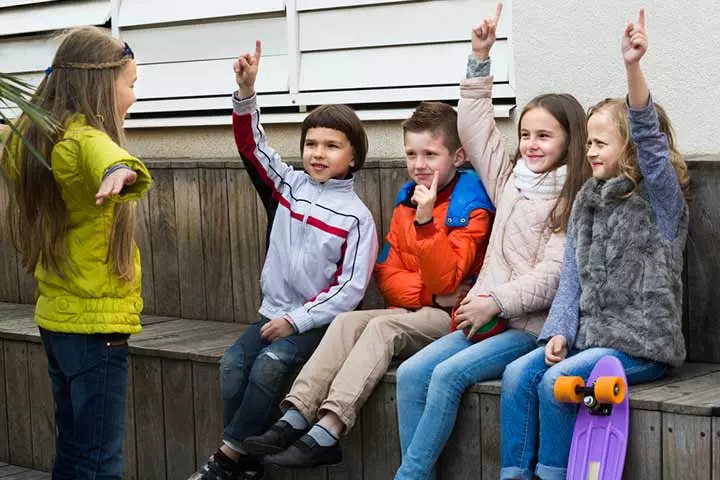
Image: Shutterstock
This word game for kids, if played mentally, is an excellent way to boost your child’s memory. It is a simple game and can be played with pencil and paper if you want to keep score.
Age group: 6 years and above
No of players: 2 or more
How to play:
- The first player thinks of a word and announces its first letter and the number of letters in the word to the others. If the player has thought of the word “Bananas,” they should say B and 6.
- The other players have to guess the word using these clues.
- If a player says another word but it has some matching words with the original word, the first player will say that the word is wrong but there are matching letters in the correct places or the wrong places.
- The next player uses these clues to make the next guess.
- You can keep the words simple or difficult according to the age of the children.
- As for the example of Bananas:
Player 2: Bullock
Player 1: That is incorrect
Player 3: Bahamas
Player 1: That is incorrect, but the As are in the correct place,
and so on.
9. Word hunting
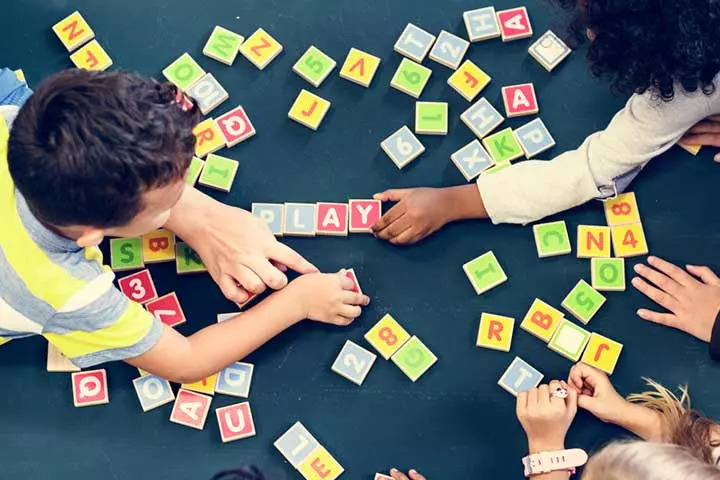
Image: Shutterstock
If your child is just learning the alphabet, this is an easy game to play. However, you can make some minor changes and tweak it for older children.
Age group: 4 to 7 years
No of players: 2 or more
How to play:
- Scatter magnetic letters, plastic letters, or letter blocks on a table.
- Ask your child to pick up a letter from the lot.
- For older children, you can write three- or four-letter words on little chits of paper and do the same procedure as above.
- For children who can read, you can ask them to pick words they see outside shops, etc.
10. Change one letter
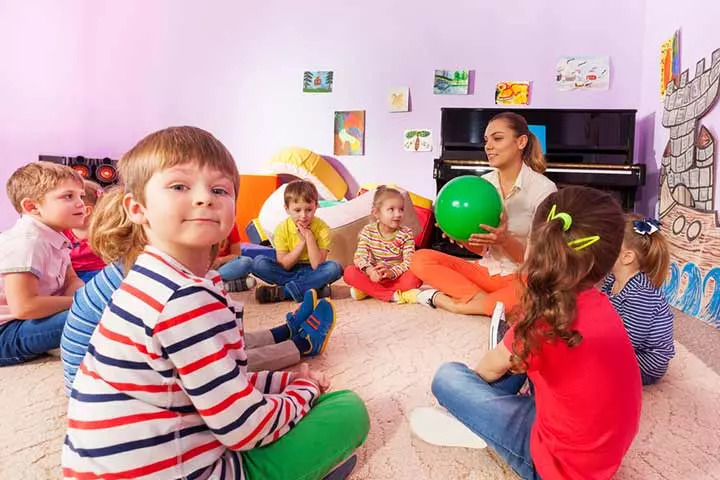
Image: Shutterstock
This is a great word game for school children. The game promotes out-of-the-box thinking and allows your child to come up with new words and even their meanings.
Age group: 5 to 10 years
No of players: 4 or more
How to play:
- Begin with a short word that has three, four, or five letters (according to the age of the children).
- Ask the children to take turns in calling out new words by changing just one letter of the previous word. E.g., park – part – dart – dark / mark – mare – mart / cart – care – case – cast – mast (and so on).
- You can set a timer or divide the players into teams to make the game more exciting.
11. Call my bluff
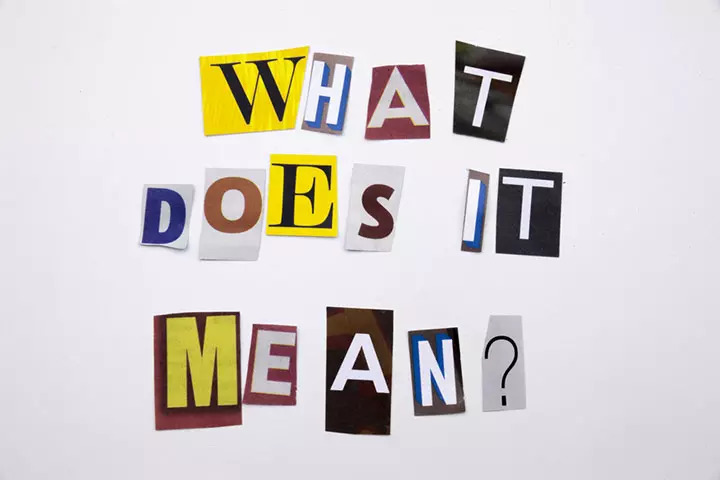
Image: Shutterstock
Call my bluff is commonly played at sleepovers and during picnics and is an excellent word game for older children.
Age group: 8 years and above
No of players: 4 or more
How to play:
- Divide the children into teams.
- Give them a set of words that are common but unfamiliar to them.
- Ask each team to look up the meaning of each word, and make up two wrong meanings for each word.
- Each team asks the other team the meaning of a word and gives them the three options.
- If the opposite team guesses the correct meaning, they get points. If they don’t, the team that asked the meaning gets the point.
- For example, let us take the word “Bewildered.” You can give three choices (a) to be left in the wild, (b) shocked or surprised, and (c) out-of-control behavior.
12. Unscramble the words
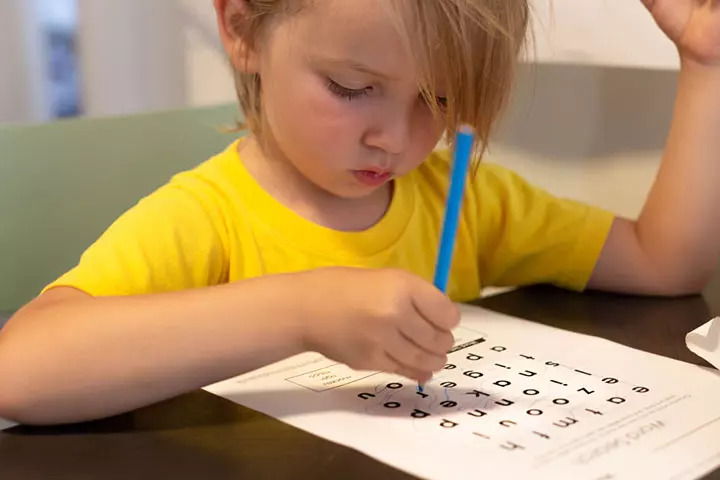
Image: Shutterstock
Let your children put on their thinking caps and play this game. The word game makes your child think and helps stir their imagination and improve their reasoning skills.
Age group: 5 years and above
No of players: 2 or more
How to play:
- Think of a word and write it down on paper but in a scrambled form.
- Your child has to think and arrange the word in the right sequence.
- You could even give clues so that they can unscramble the word faster.
- You could also write down a set of scrambled words, set the timer, and ask them to solve as many as they can within the allotted time.
13. Tell me a story
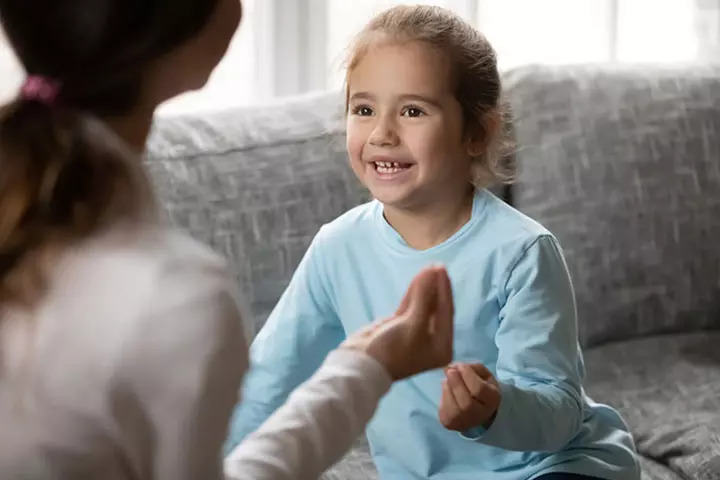
Image: Shutterstock
Children are incredibly imaginative. Children, as young as three years old, start making imaginary stories. You can play this game to fire your child’s imagination.
Age group: 5 years and above
No of players: 2 or more
How to play:
- Start a “story” with a sentence.
- The next player should say another sentence and continue the story.
- As the story grows, it becomes hilarious and absurd.
- For example, you start with the sentence, “In a village, there was a man named Joe.” The next player can say, “He wore a red shirt every day,” and the next player may say, “One day, a bull charged at him,” and so on.
14. Words in a word
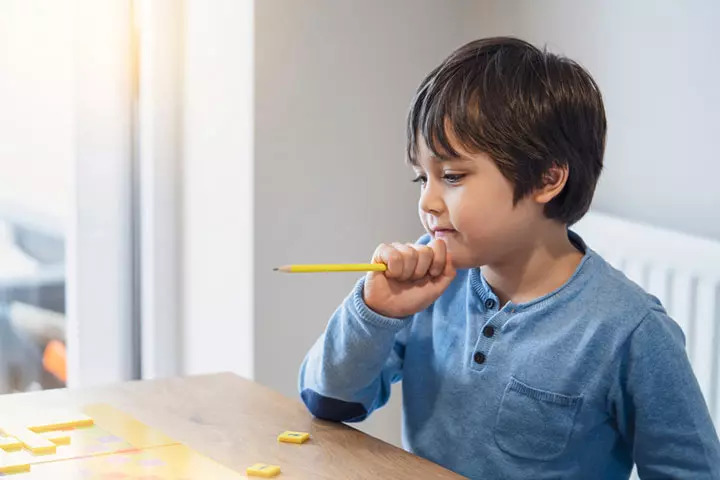
Image: Shutterstock
This is one of the most popular word games for kids and one of the best word-building games of all time. It is useful in improving your child’s English, if it is not your native language. You might have played this game in your childhood. It is now your children’s turn to play the game and keep the tradition alive.
Age group: 5 years and above
No of players: 2 or more
How to play:
- Think of a long word. A popular word choice for this game is “Constantinople.”
- Ask your child to write words starting with each letter in the word. They should use the letters contained in the word only.
- For example, Constantinople can have words such as con, cot, on, oil, no, nap, sit, and sip.
- You can set a timer and ask your child to write down as many words as they can within the given time frame.
15. I’m going on a picnic
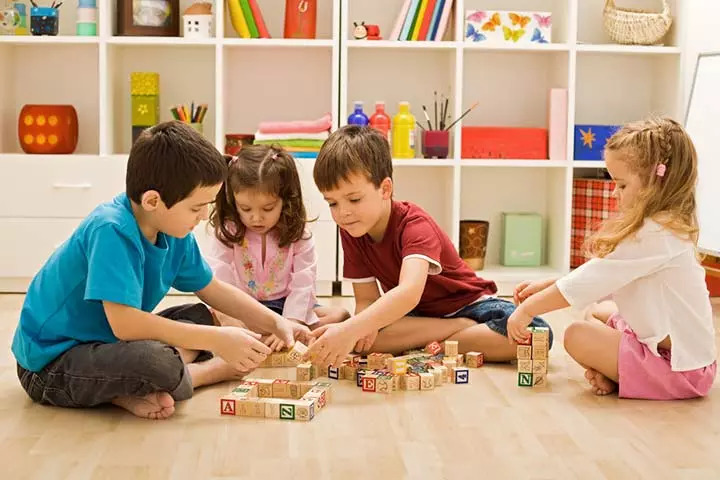
Image: Shutterstock
This game is for older children. It helps hone their creative skills and improves their memory. The word game is usually played in classrooms, but they can play it at a sleepover or even with you as a family game.
Age group: 5 years and above
No of players: 3 or more
How to play:
- The first player starts by saying, “I’m going on a picnic, and I will bring a ….”.
- The next player adds an item to the list and repeats the words.
- Each player has to repeat the items named in the exact sequence.
- If a player forgets a name or the sequence, they are out of the game.
- You can either start the game all over again or ask the next player to pick up the sequence and continue.
- For example, the game goes as follows:
Player 1: I’m going on a picnic, and I will bring a cookie.
Player 2: I’m going on a picnic, and I will bring a cookie and a Popsicle.
Player 3: I’m going on a picnic, and I will bring a cookie and a Popsicle and a bottle of juice, and so on.
16. Crosswords
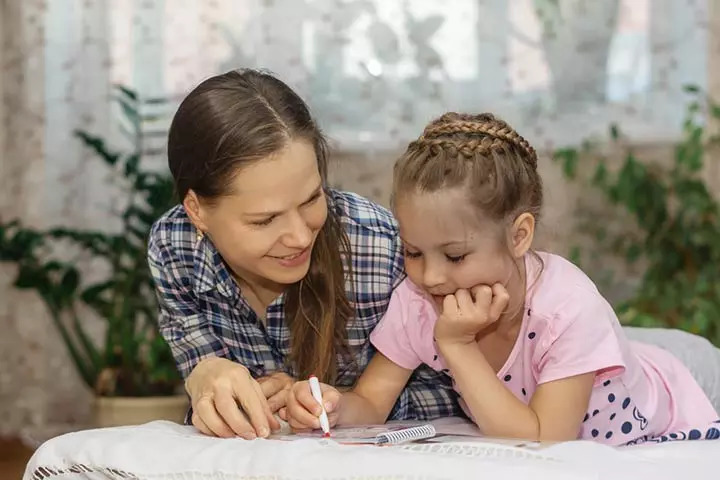
Image: Shutterstock
Solving crosswords requires practice and a lot of patience. The game will not only teach your children new words but also develop their deductive reasoning skills to a great degree.
Age group: 6 years and above
No of players: 1
How to play:
- Draw a grid with white and black squares and number each row and column.
- Then, write a set of clues at the bottom of the grid with the corresponding row or column number.
- Ask your child to solve the crossword.
- You can set a timer to make the game challenging.
- You can get some printable crosswords with clues easily on the Internet (you will find some free and printable crosswords in this link). Crosswords regularly appear in newspapers and magazines.
17. Word quest
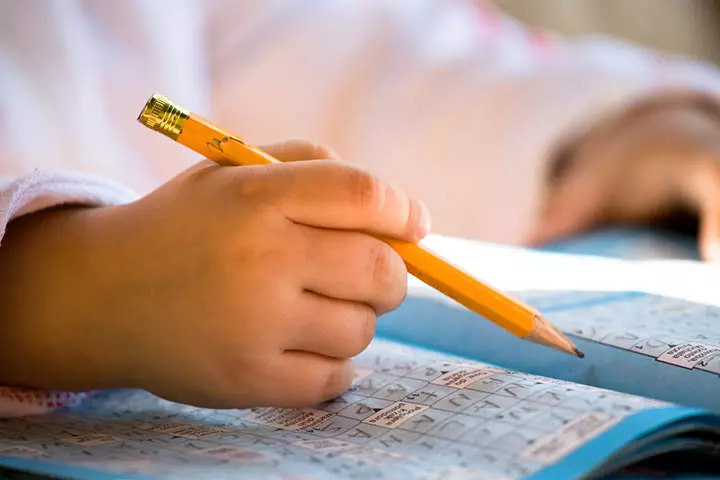
Image: IStock
Word quest is a word game for older kids. The game involves searching for words using single letters and makes your children use their deduction skills.
Age group: 5 years and above
No of players: 2 or more
How to play:
- Draw a 10×10 or 12×12 grid on a sheet of paper and divide it into squares.
- Write various words below and to the side of the grid.
- Write random letters in random squares.
- Ask your child to fill in the grid using the words you have written outside the grid.
18. Consequences

Image: Shutterstock
This word game helps stir the imagination and encourages creativity. The game works well with both children and adults.
Age group: 5 years and above
No of players: 2 or more
How to play:
- The first player writes down a sentence on a sheet of paper and passes it on to the next player.
- The next player writes the next sentence and passes it on.
- Once all the players are done with adding their sentences, you can read out the story.
- You can also write 4–5 sentences with open endings on a sheet of paper and hand them over to each player. Each player writes their version of the story and reads it aloud at the end of the game.
- For example, you can write, “There was a man named …….. He …………. a woman named ……………. They went to …………. He said, “…………………” She said, “……………………” And then, ……………..” and so on.
19. Scrabble
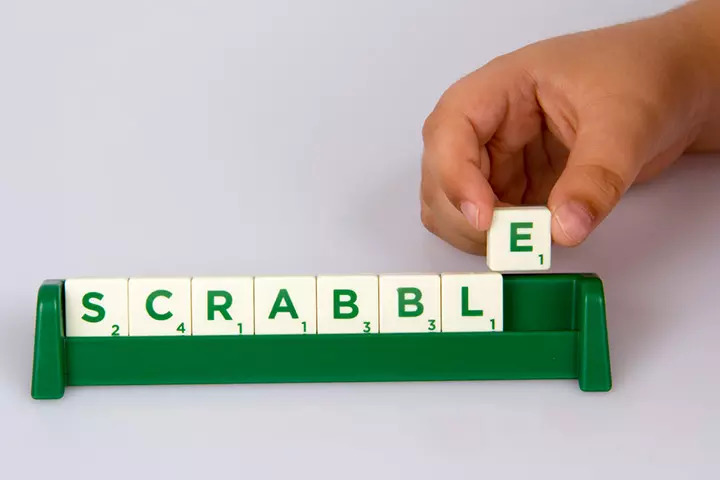
Image: IStock
Scrabble is a popular classic word game for kids. If you want your child to learn new words, this is one of the best games.
Age group: 6 years and above
No of players: 2 or more
How to play:
- Get a scrabble boards.
- Set it up and read the rules.
- The number on each letter tile tells you how many points it’s worth, and the squares on the board tell you how many points you scored.
- The player who gets the maximum score is the winner.
- After a game of Scrabble gets over, the board looks similar to a crossword.
20. Pass the bomb
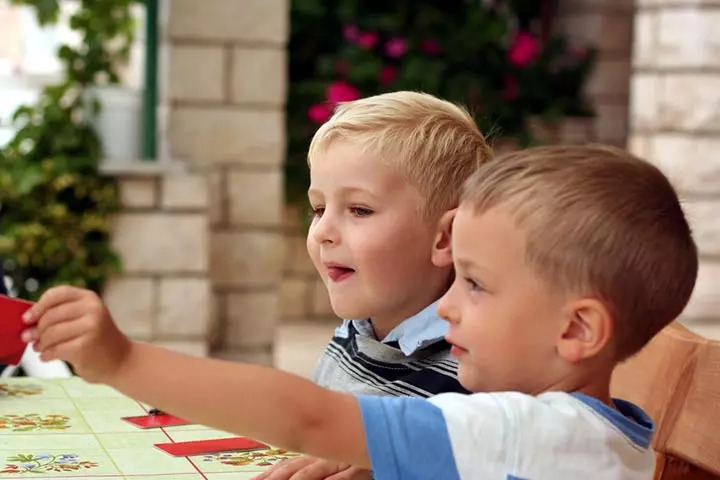
Image: Shutterstock
Pass the bomb is an educational game that will test your child’s alacrity. The first player should say a word and pass the bomb as quickly as possible to the next player, who must say a similar-sounding word. The players need to be quick in passing the bomb before it explodes. You can get this board game at a shop or simply make your own set.
Age group: 5 years and above
No of players: 2 or more
How to play:
- Take a set of card papers and write two- and three-letter words on them with a marker.
- The first player picks up a card and passes it around.
- The “bomb” goes off after a certain time. If you have made the cards at home, you can use a timer or even play music.
- The moment the timer goes off (or the music stops), the player holding the card is out.
- However, before leaving, they have to say a word that contains the word written on the card.
- For example, if the card has “ART” written on it, the child who gets out can say a word with ART in it, such as part, mart, or cart.
1. How can word games help children improve their spelling skills?
When children engage in word games, they are required to focus on the spelling of various words, which helps them to learn and remember the correct spelling of those words.
2. In what ways can word games help children with their grammar?
Word games encourage children to think about language playfully and engagingly, making it easier to understand and remember grammar rules. Word games can also help expand children’s vocabulary, an essential component of good grammar. By learning new words and their meanings, children can improve their ability to express themselves clearly and accurately.
3. How can word games help children improve their vocabulary?
Word games are an excellent way to improve children’s vocabulary skills, as they help them learn new words and reinforce their understanding of familiar ones. Games such as Scrabble, Boggle, and crossword puzzles challenge children to think critically and creatively about words, requiring them to use problem-solving skills to develop new words and find hidden ones.
4. How can word games help children become better readers?
Word games can help children become better readers by improving their vocabulary, spelling, and comprehension skills. Such games require children to identify and create words, helping them to recognize new words and understand their meanings. This eventually improves their reading skills.
When education is imparted as activities and games, children tend to grasp it much faster and retain it longer. So, if you want your children to have great communication skills, fluent vocabulary, and fascinating imagination, involve them in word games for kids. Games, such as I spy, make a word, or hink pink, are effective in keeping children engaged and sharpening their grammar and vocabulary. Another good thing about these games is that you can be involved in playing too. So, choose a suitable word game according to your child’s age and have fun while playing.
Key Pointers
- Word games stimulate the brain to improve reasoning skills, vocabulary, and language skills.
- Spur creativity through games such as I spy, rhyming words, and hink pink.
- Test the memory with games such as guess the correct word and make a word.
Was this article helpful?
The following two tabs change content below.
- Reviewer
- Author
Updated on September 17, 2020
It is never too early to teach your child early sight word skills. Children begin learning information receptively from their environments much earlier than their ability to demonstrate it through their words and actions. Even if your child is showing early signs of learning disabilities, you can support your child’s early literacy skills in ways that are appropriate for her developmental level.
1
Read, Re-Read, and Read Some More
Read to your child a few minutes every day. For infants, choose picture books that pair words with depictions of those words. There are many appropriate books to choose from that teach colors, numbers, sizes, animals and other concepts.
For toddlers, choose books with short sentences and colorful illustrations.
For both infants and toddlers, reading the same books over and over will build recognition of concepts and develop an awareness of language and sounds.
2
Increase Your Child’s Visual and Language Recognition Skills
Whenever the opportunity presents itself, point out objects in pictures, and say the name of the object to your child. Use pictures of familiar objects, magazine photos and objects in catalogs. This activity helps your child develop vocabulary, verbal reasoning skills, visual processing, image recognition, and memory.
3
Label Objects in Your Home
On index cards, print names of common household objects. Attach the cards to the objects they represent. As your child uses these objects, point out and say the words on the cards.
You can also find catalog pictures of the objects, cut them out and glue them to the index cards for more reinforcement. When your child uses an object in the house, such as a chair, ask her to show you its name. If she needs help, show her the label and say, «This is a chair.»
Be positive and smile. Making this fun for both of you is an important way to help your child enjoy learning.
4
Make Sensory Labels for Household Objects
Try decorating the words on the flashcards. Allow your child to choose decorations to glue over the lines of the letters. Once dry, you will have cards with raised ridges of glue forming the letters.
Tactile learners can feel the letters as they learn. Preschoolers can make interesting letters by pasting on pasta, yarn or sequins to the letters. Your child can trace over the letters with her fingers as she learns them if she chooses to do so.
Place the cards on the matching objects. As always, cheer your child on for a job well done. When ready, have your child practice making sensory labels with blank cards.
5
Play the Name Game
This game also requires labels. Have the child choose which label matches which object. At first, pick two cards, one that matches an object, and one that does not match. Ask your child to choose which card matches the object. Help her if needed.
Stay positive, even if she chooses the wrong answer. Cheerfully give her the correct card to place on the object. As she develops her skills, you can allow her to choose from three, four, or more cards to identify the object.
6
Reading the Labels and Matching
Once your child recognizes words on the labels and can say the words aloud, it is time to begin having her read them aloud. Prompt her to read the cards. Wait for about five seconds to allow thinking time. If she misses the word, give her the answer and set the missed card aside.
Create a pile of the missed cards and go over them again with her, having her say the name along with you. Practice the missed cards by matching them to the objects and saying the names. Make the activity game-like and praise her efforts.
7
Make New Cards Without Pictures
Once your child has mastered the cards with pictures, create a new set of cards without pictures. Play the games listed above with the new cards. If your child has difficulty with the new cards, simply place them on objects beside the cards with pictures.
Go through the games listed above while pairing the cards with the cards already mastered. Gradually remove the cards with pictures as your child gains familiarity with the new cards without pictures.
8
Teach Sight Words With Pictured Flash Cards
Use a set of flashcards of common words to teach your child consonant-vowel-consonant words. Start with five cards. Read the words to your child and point to the picture. Have him find objects in your house matching the words. As your child becomes familiar with the game, say the word, and ask him to say it too.
Play with the cards for a few minutes two or three times a week. Begin with words and objects that your child can say and are readily available in your home. Over time, your child will begin to read the words independently, and you can add more cards, a few at a time. The important part is to keep it fun. If your child struggles or becomes frustrated, it is time to stop.
Verywell Family uses only high-quality sources, including peer-reviewed studies, to support the facts within our articles. Read our editorial process to learn more about how we fact-check and keep our content accurate, reliable, and trustworthy.
By Ann Logsdon
Ann Logsdon is a school psychologist specializing in helping parents and teachers support students with a range of educational and developmental disabilities.
Thanks for your feedback!
Vocabulary plays a very crucial part in the field of education. It helps a child in learning to read and write. Like, when a child starts to identify the image and letters of a book, he/ she also tries to speak the sound of that letter and then the word.
Gradually, when he understands that he knows the word quite well, like CAT, he is able to read it properly and that too with self-confidence. However, what about when a child comes across a word or image that he does not know or has never seen before.
Well, in that case his self-confidence might shake a bit, and he might start feeling insecure. Well, such are the cases when vocabulary books for children come handy. Not just young kids, older children also, at times, come across a situation when they are unable to speak a word that they do not know the meaning of or have heard.
Must-Have Vocabulary Books for Kids To Build a Strong Vocabulary
Having a good and creative vocabulary is very important for learning how to read. But sometimes, we do get confused about how to find interesting ways to teach our children. So, in order to find some fun and effective ways to teach our kids, you can go through our article titled Fun and Effective Way to Teach Kids.
At times, we want to buy some toys and books for young ones that are fun as well as teach, so for that you can take help of our article Best Alphabet Learning Toys and Books for Kids.
Today, we will study about the Best Vocabulary Books for Kids that will teach you how to inculcate vocabulary development in your child’s future learning plans.
However, before moving forward, let me talk to you about our number one choice and best value pick of a vocabulary book for the kids.
Our #1 Choice: First 100 Words, It is a very colourful board book, whose pages are made of tough cardboard so they cannot be torn easily. It has a huge range of simple words.
Best Choice for 3-6 Year Old Kids: Banish Boring Words, This book has a list of 40+ words. It will help a child learn these words, understand their meaning and know the words with similar meanings too.
Best Choice for 7+ Year Old Kids: Merriam-Webster Children’s Dictionary, It is a must-have for every growing child to be used in school as well as at home. It has images, along with the words and their meanings too.
Now, let us learn about the ten must-have vocabulary books for kids.
1. My First 1000 Words
It is an early learning book for young kids. It teaches them small words, which will be easy for them to remember and understand, as well. This book has words starting from all letters, of different shapes and colours, names of different means of transport, professions, parts of human body and the object around us.
Also, all the content given in this book is age-appropriate and hence the children are able to learn the words easily, which brings them a lot of joy.
How this book helps in learning?
All the words given in this book help a child in expanding his vocabulary. The book also has an index in it, which makes locating any particular word quite easy. Many small activities given in the book help the children revise what they have learnt, as well.
- Best Suitable for Age: 2 to 4 years
- Our Rating: 4.8 out of 5
2. Blossom English Vocabulary Book
This book has a range of itself which is quite apt for children. This is quite an interesting book, which enhances the word power of a child to a huge extent. It has many exciting activities that tend to keep the child engaged.
The entire book is written in a very simple manner, which makes it very easy to understand.
How this book helps in learning?
This book helps a child in build his vocabulary by upgrading his linguistic skills through a series of topics, like spelling, words and their meaning and singular and plural words, as well. The book also helps a child in improving his/ her communication skills.
- Best Suitable for Age: 5 to 10 years
- Our Rating: 4.6 out of 5
3. First 100 Words
This book is our number one choice among our list of the top ten must-have vocabulary books for kids. It is entirely made on soft padded board, which makes it the best first word book to be given to a young child or baby. Due to it being made of board, the child will not be able to destroy the book in any way, easily.
Through this book, your little one will learn to read, speak and write new and small words. All the words given in the book are those that are used in our daily lives. Through this book, the child himself will be able to look at the picture and understand the word and then speak it, as well.
How this book helps in learning?
This book will help the child in learning vocabulary with the help of its many beautiful images. The big font sizes of all the words that are written make it easier for the kids to read the word. It has more than 100 images and words for a child to see, be able to read and learn.
- Best Suitable for Age: 2 to 5 years
- Our Rating: 5 out of 5
4. 10 Minutes a Day Vocabulary
This book helps a child become a master in vocabulary if he/ she spend just 10 minutes reading it, every day. It acts as an ideal beginning for youngsters to enter the world of words. It has many games and small tests in it, which will help your child in improving his spelling and pronunciation skills.
The many games and tests given in this book are quite interesting and innovative and children tend to enjoy them a lot. They take very less time, so it is like maximum benefit in minimum time.
It has many timer clock tests that you can give to your child by setting a time limit, which will tell them the progress they have made and how much more they have to learn. Each topic has many ten minute activities, like synonyms, words, their meanings and verb endings.
How this book helps in learning?
This book helps the children in learning new words every day. It has a Parents’ Notes Section in it that has answers to all the activities. It also explains all the basic mistakes that the children might make and has suggestions about how to avoid such errors.
- Best Suitable for Age: 7 to 11 years
- Our Rating: 4.7 out of 5
5. Banish Boring Words
This book is our best choice for 3-6 year old kids from all the given option of vocabulary books. It is a must have book for every growing child. This book has amazing similar words or synonyms for regular words, such as good, nice, particular, etc. The book has various chapters that deal with the words on a particular topic.
This book can also become a best vocabulary book for young children as it is able to create an impression in a child’s mind that he will not be able to easily forget the words that he has learned through that book.
It helps the children find just the right similar word for any word they want. It, in turn, help improve their vocabulary.
How this book helps in learning?
The book helps the student in learning by giving them a chance to enlarge their vocabulary through its carefully arrange list of words in different columns. It also helps them with the various grammar topics, like Action Verbs.
- Best Suitable for Age: 3 to 6 years
- Our Rating: 4.8 out of 5
6. Blippi: First Words
It is a photographic board book based on the very famous YouTube sensation Blippi. He is an over-grown boy, who helps the children learn new words in a fun way. The book teaches the children the names of different things that they see each day.
Blippi makes understanding and remembering new words quite easy as it teaches them in an exciting way. He is such a favourite of children that the children will instantly remember whatever new word he teaches. Also, each word has a beautiful, colourful and bright image along with it.
How this book helps in learning?
This book helps young children in learning new words by describing every day things that are around them and they see every day. The book also help the kids learn the names of the various toys, clothing, colours, shapes, plants and animals. Also, the book has almost 60 words that are introduced to the children.
- Best Suitable for Age: 2 to 5 years
- Our Rating: 4.9 out of 5
7. Merriam-Webster Children’s Dictionary
This book is our best pick for the children who are above seven years of age. It is a children’s dictionary, which has more than 35,000 words with 3000 images explaining some of those words. It is a very good reference book for children to be used at both home as well as school.
All the entries given in the book have a proper definition, explanation regarding their spelling and ways to pronounce them. The book also has examples explaining how the relevant words can be used in a sentence.
How this book helps in learning?
This book helps the children in learning new words by way of many visual images. It is quite understandable and easily accessible. The book’s easy-to-read print help the young learners in remembering the words, quite easily.
- Best Suitable for Age: 7 to 12 years
- Our Rating: 4.9 out of 5
8. Daily Word Ladders
This book has more than 100 reproducible word study lesson plans, which lend a helping hand to the young children to boost their reading, speaking, phonic and vocabulary skills. After going through this book, the children will be able to achieve new levels in their speaking skills.
Activities such as climbing the ladders are given, in which clues are given on each step. The children have to read them and then rearrange the letters to make the correct words and reach the top while doing all this.
In this manner, the children will keep on improving their vocabulary skills and slowly and gradually become a master in the field.
How this book helps in learning?
The book helps the young teens in learning new words through the different fun-filled activities. It is an excellent source for developing speaking skills and improving the vocabulary skills of a child.
- Best Suitable for Age: 8 to 14 years
- Our Rating: 4.7 out of 5
9. 200 Must Know Sight Words Activity Workbook
This is an activity workbook. It has almost 200 sight words that a child should definitely know. In this book, the kids are able to learn and get to know new words. Space is given under each word for the kids to write, trace and practice.
The book has many fun and engaging activities for a child to learn from. The gradual increasing difficulty level of the book helps a child become smarter, as and when the book progresses. It also has a table of contents.
How this book helps in learning?
The book is a store house for learning new and common words for young kids. It teaches them the spelling of new words and helps them grow their knowledge of new words. It also acts as a great way to keep the children busy for a short period of time and help them learn new words too.
- Best Suitable for Age: 5 to 8 years
- Our Rating: 4.8 out of 5
10. Vocabulary Flashcards
Flashcards are a source that makes the process of learning quite easy and enjoyable. It makes the process of learning new words fun. The various cards can be used as games, where you can play with your child and help him learn new words, teach them their meanings and also ask them to make new sentences with them.
How this box helps in learning?
The box has words that are arranged in a synchronized order. All the word cards have their explanation, pronunciation and similar words written on them.
- Best Suitable for Age: 5 to 7 years
- Our Rating: 4.7 out of 5
10 Easy Tips to Build and Improve Your Child’s Vocabulary
For a child to become to the master of words, he/ she must improve his/ her vocabulary. So, here are ten quick and easy tips to do so:
- Talk in English: The more a child will hear new words, the more they will learn. So, to do that always talk and interact with your child in English.
- Read with your child: In order to improve your child’s word skills, try to read aloud books and stories with your child.
- Use name tags: Put name tags of things around the house. So, that the children keep on seeing them regularly and remember the names.
- Play game of words: Play different types of word games with your child, like I spy or scrabble. This will enhance your child’s word speaking skills.
- Write messages: Encourage the child to write small messages for their friends or family members. This will make them learn new words and practice them too.
- Use new words every day: Every day use new words that mean the same while speaking to the child, so that their knowledge increases and they are able to learn new words.
- Create a word ladder: Make a sticky note of a new word every day and paste it on a wall so that the children are able to read them and learn new words and revise the old ones.
- Word of the day: Give a new word to the child every day and tell them to use it as many times as they can while they speak.
- Play with words with your child: While talking with your child, tell them a new word and ask them to guess its meaning. Then, ask them to speak a word that is similar to the word given. Do all this in a fun and playful way.
- Pretend game: Play pretend game with your child and ask him to ask questions from their pretend friend and answer them too.
Generally, the best vocabulary books for kids are those that have a lot of images along with the words. This makes it easier for the kids to remember the words. It enhances not just their learning skills but also their observation skills.
These words are mostly those that are commonly used and tend to come up in our daily use and conversation. The best vocabulary book for children also tend to discuss many grammar topics, and have a list of many interesting and creative synonyms for regular boring words, like happy.
Teaching vocabulary to preschoolers is not just about giving the definitions and some examples, but about creativity and fun techniques to practice the words with them. One of the best and practical ways to teach them vocabulary is using games. Here are some of them.
Categories
This game helps children to categorize the words in the columns, to get their meanings and to find a relationship between these words. For each category, you can use flashcards (fruit, vegetables, clothes, sports, etc) and give a list of different words to your kids (banana, skirt, apple, tomato, tennis, baseball, shirt, shorts, kiwi, etc.).

out the odd word
This game is a bit similar to the previous one because it is again related to categorizing. Here the teacher gives a list of words, asking kids to cross out one odd word from each line. For example:
- November, July, September, October
- Cold, snow, January, summer
- Monkey, banana, apple, kiwi
- Run, tennis, baseball, football
- Taxi, car, bus, house
How many?
Here all you need is to show a picture of different things (animals, fruit, vegetables) and to ask your younger learners to count how many things there are in the picture.
2-litre jar
This is a fun game to play with your kids. You show them a 2-litre jar and ask to come up with words that can be placed in this jar. For example, they can say coffee, candle, but they cannot say happiness or animal, because they cannot be placed in this jar.
I spy
One might call this game an old one, but my younger learners adore it. To begin the game choose an object and give some hints to your kids, such as: “I spy something that is big and blue”. The pupil that guesses the word takes a turn to spy something and let other kids guess.
Apple Pass
Get your kids to sit in a circle. You can use a real apple or a fake one. While you pass the apple to the next student, you must say one English word. The student then throws to another student and says a different English word. The student who fails to catch the apple or to say a word is out. And the game continues until you have one winner. It can be played with different categories, such as fruit, vegetables, animals, etc.
Touch
This game is all about giving some instructions. The teacher says: “Touch the board”, “Touch the chair”, “Touch something black”, etc. And young learners go around the classroom to find the appropriate objects and to touch them.
Basketball
Make a paper ball and prepare a box where your kids can throw an imaginary ball. Show a flashcard to the first student. If they say the right word and throw the ball into the box, they get two points. But if they fail to do one of these things, they get just one point. The person who gets the most points is the winner.
Pictionary
This is a nice activity for recycling vocabulary. You can play this game in groups. Tell one of the students a word and ask him/her to draw a picture of it on the board. The first student to guess, what the picture is, gets a point and takes a turn to come up to the board and to draw the next picture.
Line True or False
Put a line of tape on the floor and make appropriate signs for «True» and «False». Show a flashcard and say its word (you can say a wrong word). If students think that you have said the correct word they jump on to the True side, if not they jump on to the False side. The student who gives the wrong answer is out.
What games do you play with your preschoolers?
English word games are a fun way to get kids to learn new vocabulary skills, sharpen their existing reading skills, and develop their writing skills all in one go. There are tons of fun games to help foster a love for language at a young age and teach them valuable literacy skills along the way.
Here is a look at 20 cool games that put a new twist on classic word games or introduce you to some new approaches to learning vocabulary skills.
1. Popsicle Words
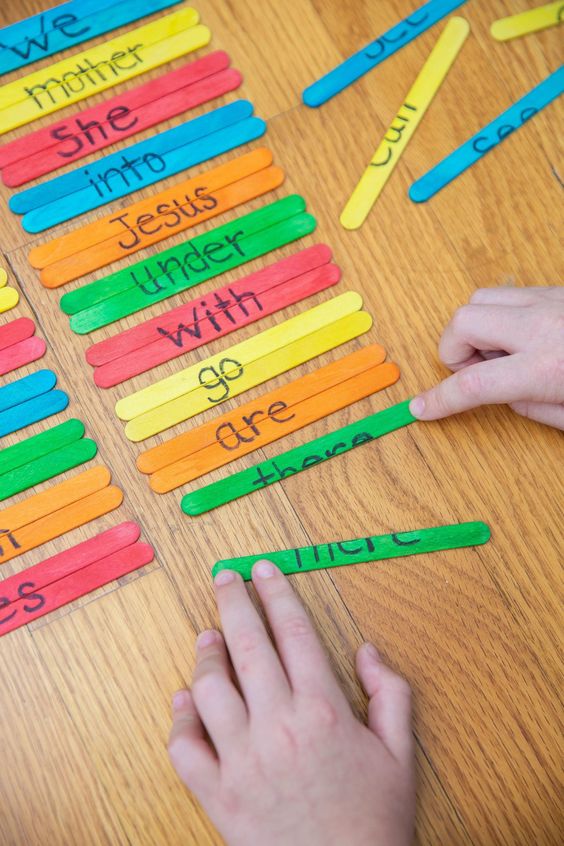
This word game for kids is easy to set up. Simply write words across the 2 popsicle sticks of the same color and let kids match up the two halves of the sticks. Use colored sticks for young readers or one color to make it a bit more difficult.
Learn more: Good and Beautiful
2. DIY Wordle
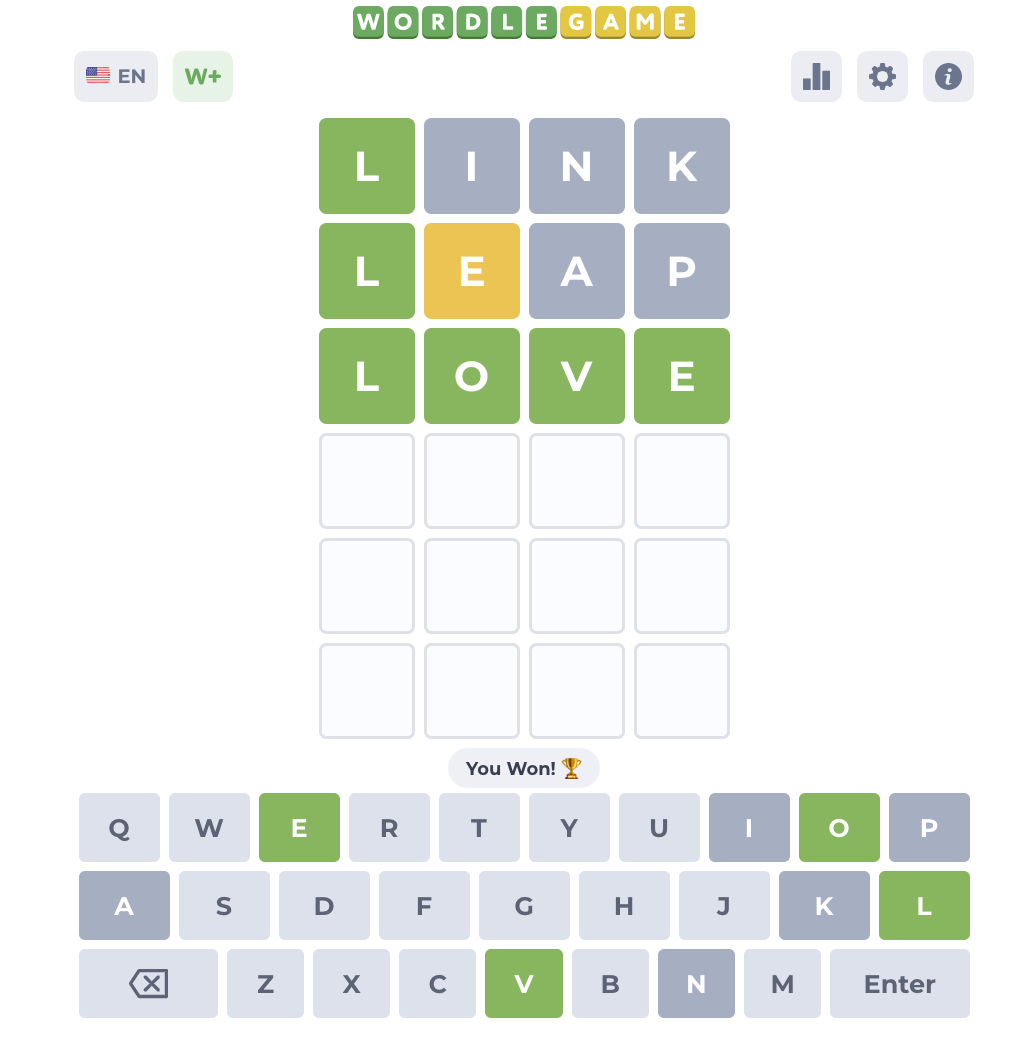
Wordle is the online word game that has taken the internet by storm. Create custom wordles for kids using words they know or might be learning at school. This DIY version is quick and easy to use and a favorite educational game among learners.
Learn more: Wordle
3. Stop the Bus

This is a classic classroom game that can also be played at home with just a piece of paper. Kids get assigned a letter and must produce one word in each category starting with that letter. It is a game of speed so their language skills are truly out to the test and truly the easiest paper game to set up.
Learn more: ISL Collective
4. Online Hangman
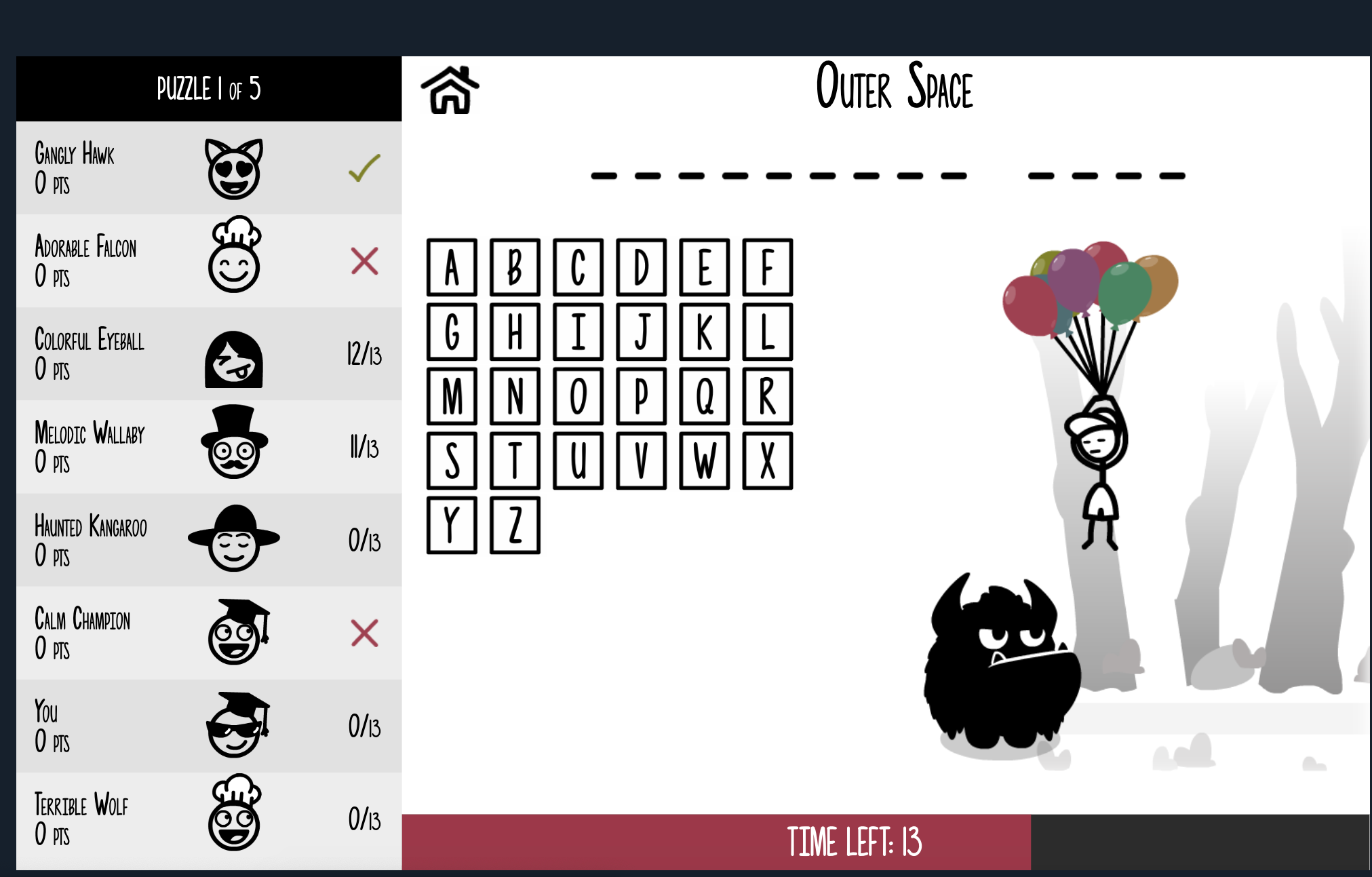
Hangman is one of the best classic word games out there but this fun online version puts a new spin on it. The man is floating above a hungry monster and each incorrect guess pops one of his balloons, bringing him closer to his doom. Don’t miss the chance to play this fun new version of one of the most popular word games of all time.
Learn more: Cool Math Games
5. Bananagrams
Bananagrams is a must-play word game for kids of all ages. It uses Scrabble-like letter tiles and players grab tiles and form words. Adding the element of time really puts their spelling skills and concentration skills to the test.
Learn more: Triple S Games
6. Make a Wordsearch
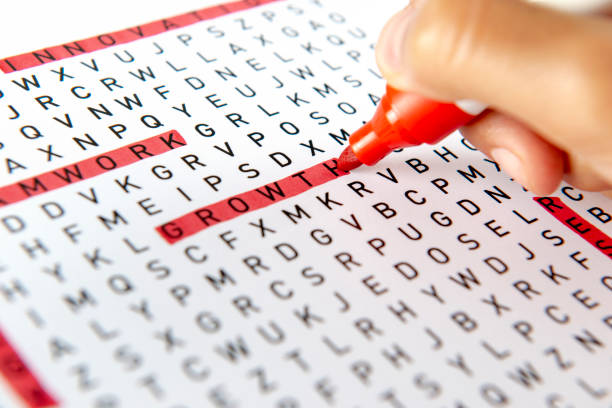
Create a custom word search for kids using words from their in-class theme or that link to a theme at home. You can even throw some silly words in the mix to make it more difficult or add their names for a fun surprise. This classic paper-based puzzle game remains a firm favorite word game.
Learn more: Discovery Education
7. Storytelling Game
Storytelling games are a great way for kids to use their spoken word skills. A spinner or story dice will give prompts for the story and dictate which direction it must go in. Kids can only use one word or one sentence at a time in this conversational game, forcing them to think quickly and creatively.
Learn more: The Colorful Apple
8. Wordicle
This should be a new addition to family game night as Wordicle combines a card game and a dice game to form the ultimate educational board game. Players roll the dice for random letters and use the letters on the cards in their hands to make the highest scoring word possible.
Learn more: UI School Supply
9. Toss the Balloon
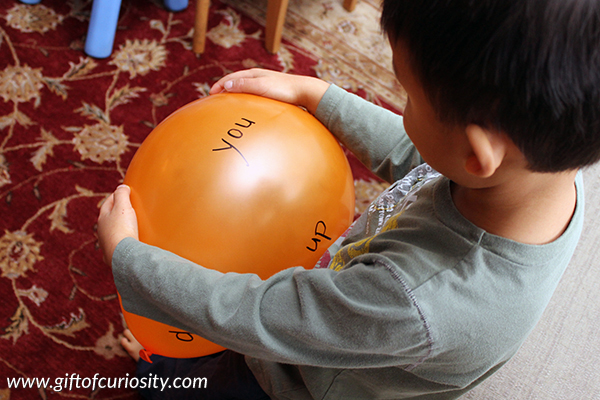
To start this sight word game, write a collection of words on a balloon. Toss the balloon in the air and let your child catch it. Whichever word is facing upwards should be read out loud and used in a sentence. Prompt kids who can write to write the words on the balloon themselves. This fun vocabulary game will have kids jumping for joy as they try to catch the balloon.
Learn more: Gift of Curiosity
10. Word Connect
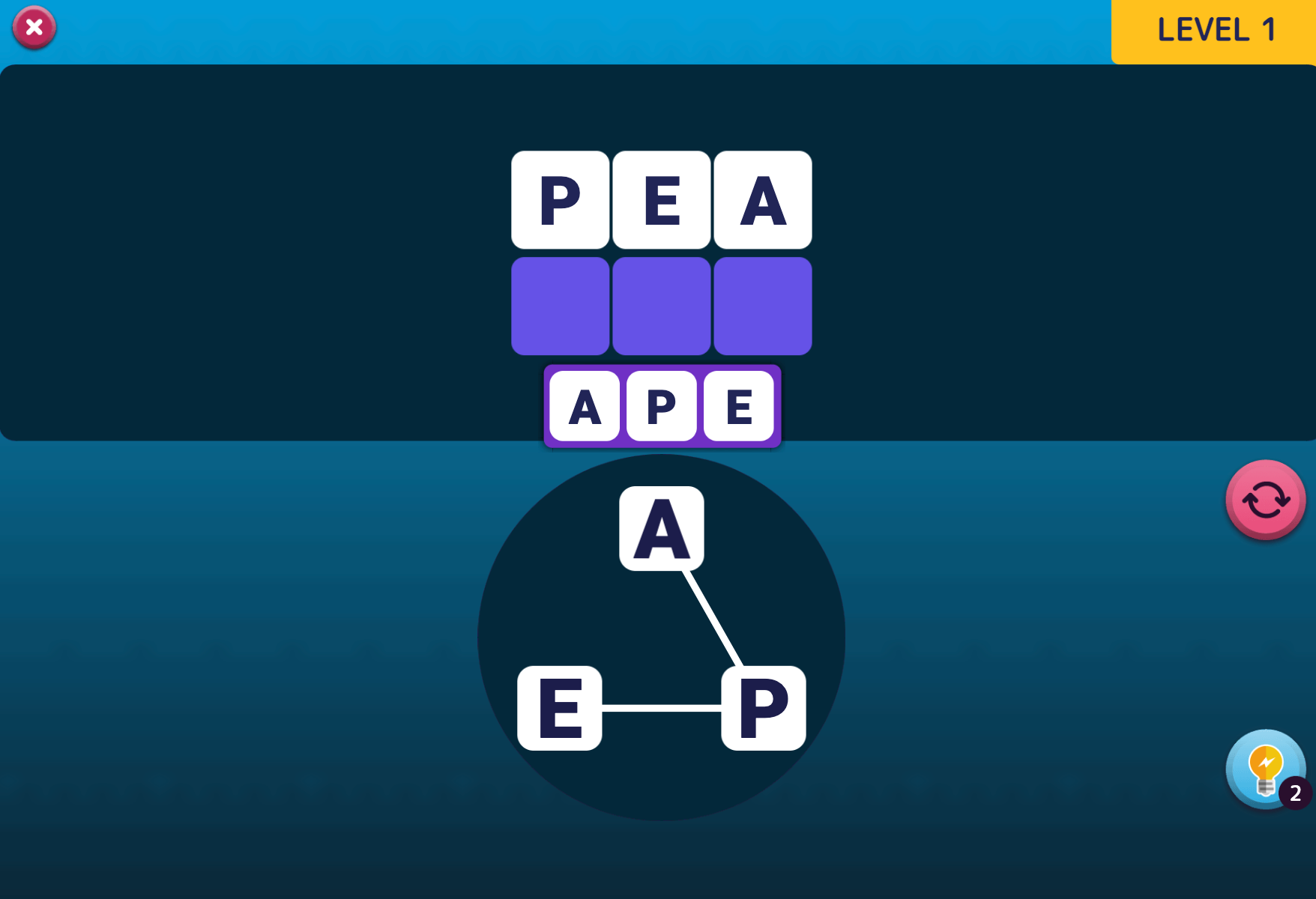
Word Connect is a fun spelling game that kids can play online. Simply connect the letters in the circle to create words using the same letters. Each level adds one more letter to the circle increasing the game difficulty. This game for kids helps build kids’ vocabulary as they discover new arrangements for the same letters.
Learn more: Mindgames
11. The Minister’s Cat
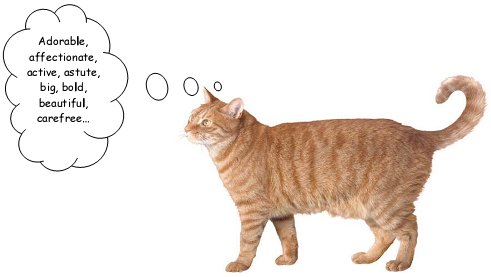
This classic game was a popular parlor game but can still be played to teach kids all about adjectives. Each player recites the phrase «The minister’s cat is a …» and adds an adjective to describe the cat, moving along the alphabet. An adorable cat, a bouncy cat, a cool cat, and so on. This is a great way to work on listening skills and memory skills as they cannot repeat words and hone alphabet skills as they should determine which letter to use next.
Learn more: Wild Billy
12. Hink Pinks
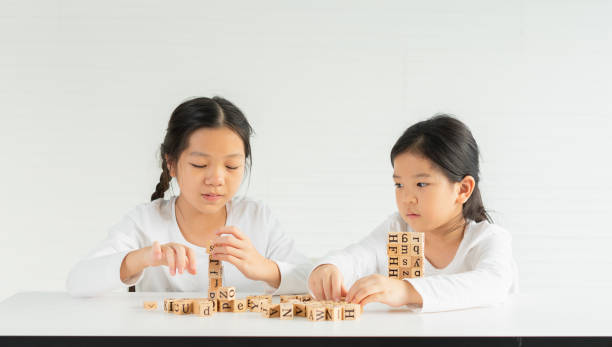
This fun word game for children is all about rhyming. One player must think of a rhyming phrase like «flat hat» or «wet pet». They should then use another phrase to describe it like «smashed fedora» or «soaked dog». It is up to other players to guess the rhyming 2 words.
Learn more: Hub Pages
13. Boggle
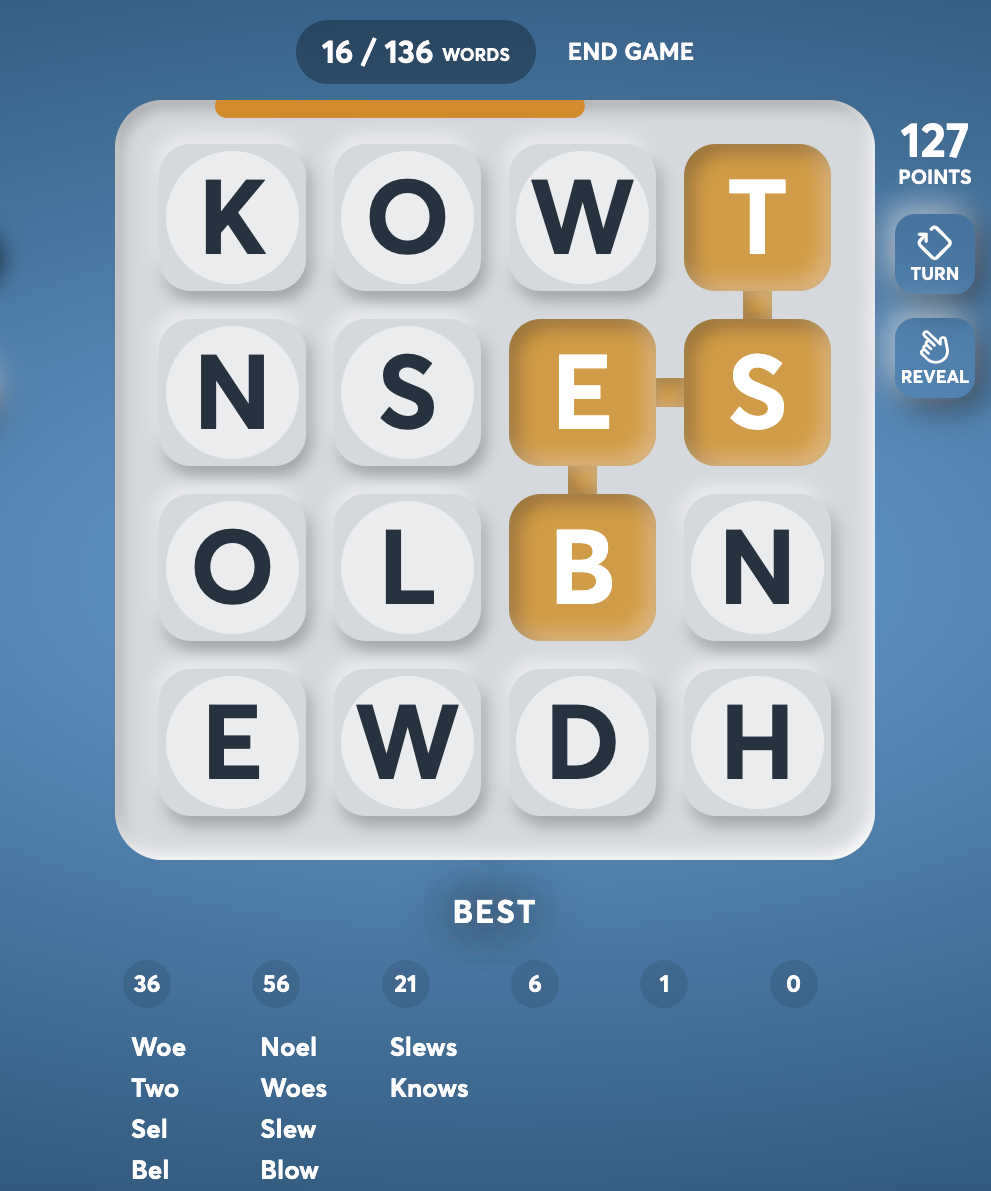
Boggle is a fun and educational game that has unlimited replayability. This handy online version allows you to play this challenging word game without buying the board game and is always handy on a mobile device.
Learn more: Wordshake
14. Blurt
Blurt is a fun new board game, perfect for players who always feel the need to blurt out an answer. One player reads out a description from a card and other players need to blurt out the word in question. Correct guesses will move you forward on the game board.
Learn more: The Dice Tower
15. Codenames
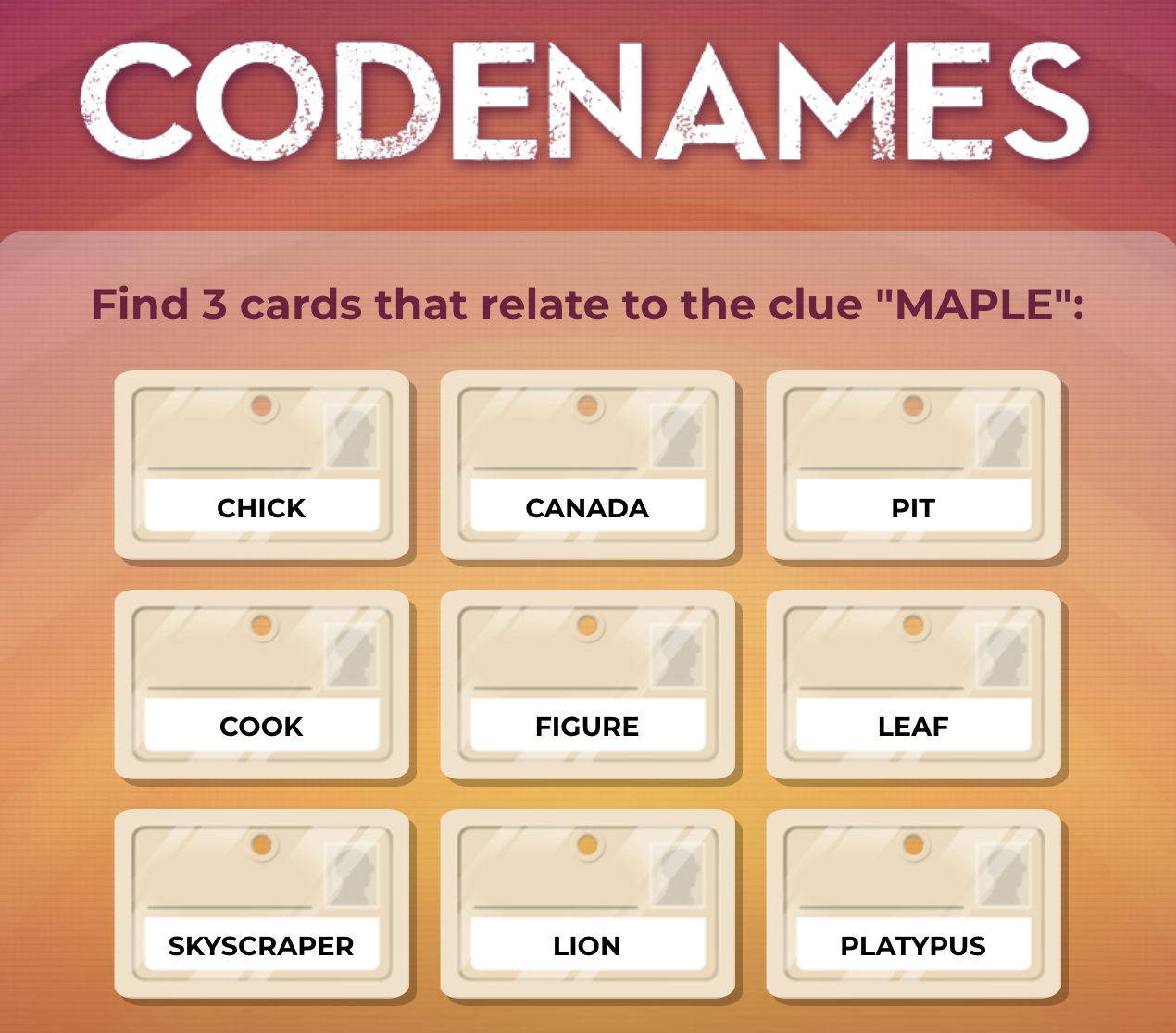
When it comes to word-based board games, few are as popular and well-known as Codenames. Players must call out a word that connects to one or more of the words on the playing cards. Their team must guess the word without accidentally guessing words assigned to the opposing team. This fun online version is free and lets kids play on their own too.
Learn more: Codenames
16. Sight Word Candyland
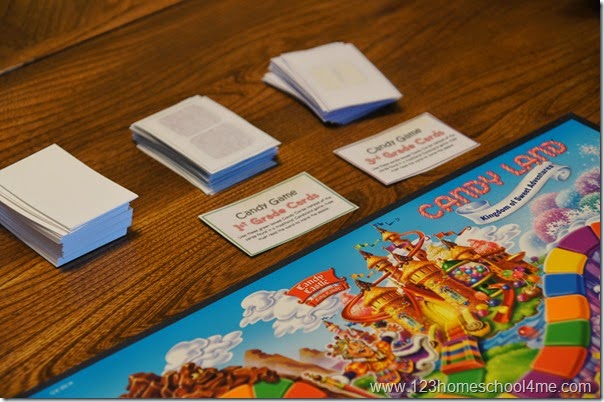
If you already own the Candyland board game, this adaptation is the perfect simple word game for your kids. This game works on literacy skills and minimizes screen time simultaneously and all you need to do is print out these free game printables. There are also cards for different grade levels so kids of many ages can play together, making it the perfect game for family time.
Learn more at 123 Homeschool 4 Me
17. Sight Word Splat
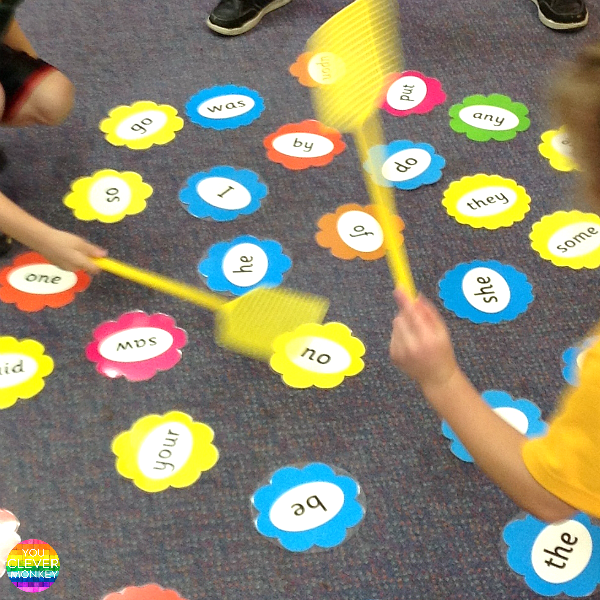
A couple of fly swatters quickly turn a normal sight word game into a very competitive word game. Write words on papers, laminated cards, or sticky notes, and let kids slap them with their fly swatters as you call them out. It is guaranteed to be a lively game as kids rush to show off their fundamental reading skills.
Learn more: You Clever Monkey
18. Silly Sentence Jenga
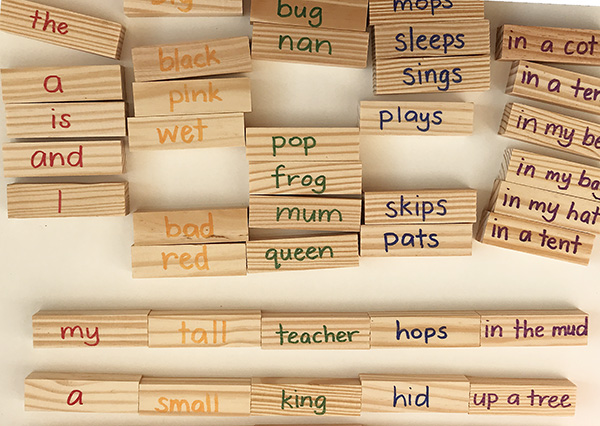
Write parts of a sentence on some Jenga blocks and let kids build sentences as they pull the pieces out in a hilarious game of Jenga. This printable word list will give you a good foundation for the game or you can replace them with your own words according to a theme or what your children like to learn about.
Learn more: Childhood 101
19. Secret Words
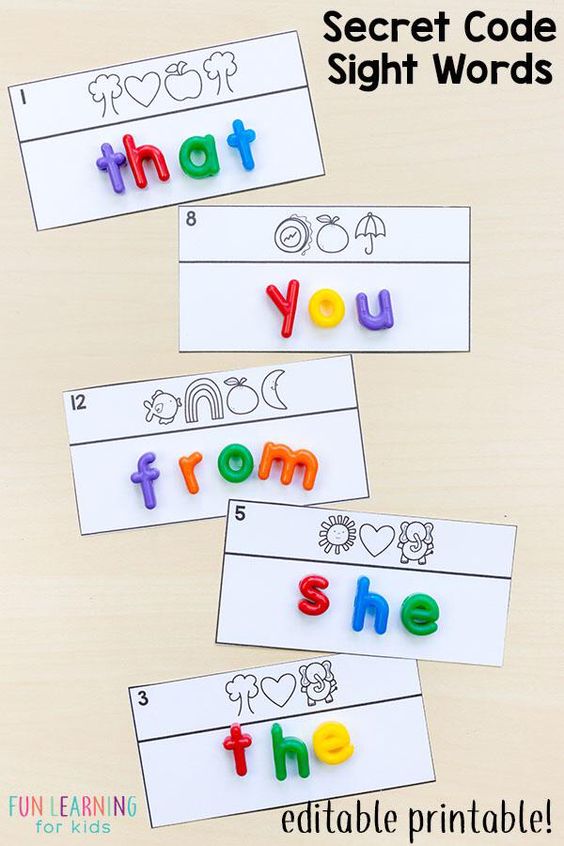
This vocabulary game for kids is great for language development. Print out cards that spell out a word using simple pictures to spell out a word. An apple would represent an «a» and a ball will represent a «b» for example. Kids can use magnetic letters, letter blocks, or scrabble tiles to decipher the secret words.
Learn more: Fun Learning For Kids
20. Word Hunt

Even the most reluctant learner will love going on a word treasure hunt. Put some sticky notes all over the house with words printed on them. Give kids a square grid with the matching words written in each block. Kids must find the sticky notes and complete their grid to win the game.
Learn more: Walking By The Way











